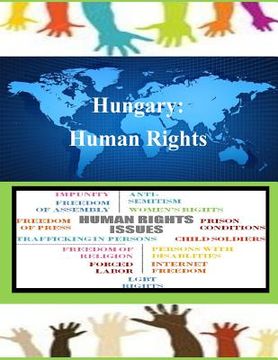Compartir
Hungary: Human Rights (en Inglés)
United States Department Of State (Autor)
·
Createspace Independent Publishing Platform
· Tapa Blanda
Hungary: Human Rights (en Inglés) - United States Department of State
$ 28.24
$ 43.44
Ahorras: $ 15.20
Elige la lista en la que quieres agregar tu producto o crea una nueva lista
✓ Producto agregado correctamente a la lista de deseos.
Ir a Mis Listas
Origen: Estados Unidos
(Costos de importación incluídos en el precio)
Se enviará desde nuestra bodega entre el
Lunes 29 de Julio y el
Miércoles 07 de Agosto.
Lo recibirás en cualquier lugar de Ecuador entre 1 y 3 días hábiles luego del envío.
Reseña del libro "Hungary: Human Rights (en Inglés)"
Hungary is a multi-party parliamentary democracy. The unicameral National Assembly (parliament) exercises legislative authority. Parliament elects the president (the head of state) every five years. The president appoints a prime minister from the majority party or coalition following national elections every four years. In 2012 a single round national election system replaced the previous two-round system. The most recent parliamentary elections (in 2010) were assessed as free and fair. The conservative Fidesz-Christian Democrat coalition won a two-thirds parliamentary majority. Fidesz's prime ministerial candidate, Viktor Orban, took office in 2010. Authorities maintained effective control over security forces. There were reports that security forces committed human rights abuses. Among the most important human rights problems during the year were societal discrimination and exclusion of the Roma (also known as Romani), and anti-Semitism. Discrimination continued to significantly limit Roma access to education, employment, health care, and social services. The government continued to use its two-thirds parliamentary majority to implement constitutional reform. It adopted the Fourth and the Fifth Amendments to the Fundamental Law (constitution). The Fourth Amendment in particular attracted intense international criticism and further reinforced concerns that checks and balances were eroding. Human rights NGOs stressed that political liberties and their guarantees have been subject to systematic curtailment in the past three years and that the Fourth Amendment was a new component of this process. The Fifth Amendment partially responded to international criticism, but concerns remained that provisions contained in the new legislation could undermine equal treatment of religious groups and media pluralism. Other human rights problems during the year included police use of excessive force against suspects, particularly Roma, laws that caused concerns over the powers of the media regulatory authority which could encourage self-censorship, government corruption, societal violence against women and children, sexual harassment of women, anti-Semitic assaults and vandalism, a politically determined process of recognizing churches, and trafficking in persons.
- 0% (0)
- 0% (0)
- 0% (0)
- 0% (0)
- 0% (0)
Todos los libros de nuestro catálogo son Originales.
El libro está escrito en Inglés.
La encuadernación de esta edición es Tapa Blanda.
✓ Producto agregado correctamente al carro, Ir a Pagar.

